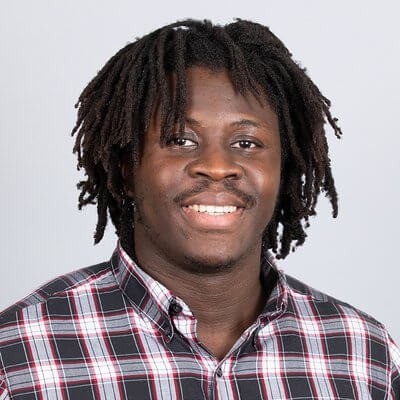What is your educational background?
I hold a Bachelor of Science degree in Industrial Chemistry from Covenant University, Nigeria and I am currently a fourth year PhD student in Department of Chemistry at Syracuse University, New York.
What is your current occupation?
Graduate student and Teaching Assistant. The primary focus of my research is the total synthesis of biologically active natural products. My current synthetic target is Phomactin A, the most structurally complex member of phomactin family. The Phomactins are platelet aggregating factor antagonist making them potentially useful in the development of novel therapeutics for respiratory and other ailments. I also teach sophomore organic chemistry.
What or who got you into STEM?
My experience as an undergraduate researcher where I worked on the isolation of biologically active phytochemical compounds was an early and foundational experience. This research revealed to me that nature holds the answer to many human problems especially around the area of drug development. I sought to further explore nature’s complexity by trying to recreate interesting (synthesizing) compounds that have been isolated from natural sources.
What is the biggest challenge/barrier you have faced as an African in STEM?
Not enough representation on the global STEM stage. There are not a lot of literature on scientific research by Africans. It makes it a little bit difficult to feel like you belong in space if there is no one who looks and shares similar experiences with you to look up to. African science is not being actively talked about. Even when science is done on African soil, the voices that tell the story do not belong to Africans.
How do you think your background/upbringing has been beneficial in your journey/career?
I think growing up in Nigeria gave me a thick skin of some sort. There is a culture of resiliency and strong work ethic that I continue to draw from during my graduate career. Also, my experience conducting research in Nigeria with very limited infrastructure has made me appreciate what I have right now as a graduate student in the United States. So, regardless of the challenges that comes with being a PhD student, I am still able to go to work each day grateful that today might be the day progress is made and that lack of adequate research tools is not one of the obstacles that I have to overcome. The sense of pride that I have in being African is also a source of motivation for me; to potentially be a role model for a younger Africans is one of the reasons I get up in the morning.
How do you think we can start to change the narrative surrounding African contributions
to global STEM research & careers?
I would like to see Africans outgrow our cravings for external validation. We do not need approval from the West to know that our science is of high caliber. Additionally, I think Africans should focus on, celebrate, and revive our indigenous knowledge. Regardless of what the history books might say, Africans were doing great things before the colonial masters came. “African science” needs to be done and told by Africans.
What advice would you like to give to young, aspiring Africans in STEM?
I would say that this is bigger than you. For every one African that thrives in the STEM field, there is at least 10 other Africans who would dare to dream just because of that one success story. When things feel challenging, remember, it is time your voice is heard and you belong!
Do you have any projects you’re working on that you would like us to highlight?
I am a part of a Nigerian Mutual Aid organization which was formed as a way to assist the most financially disadvantaged citizens of Nigeria as they navigate the economic hardships that have been heightened as a result of the COVID-19 pandemic. This group consists mainly of a few Nigerians in diaspora. We hope to expand this network to support a variety of needs, including food, housing, university entrance exam fees, and so forth.




